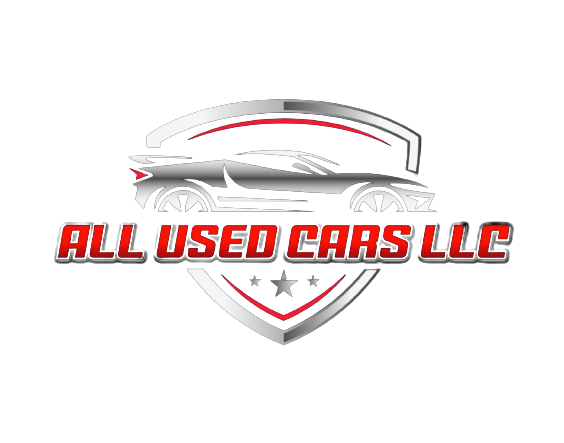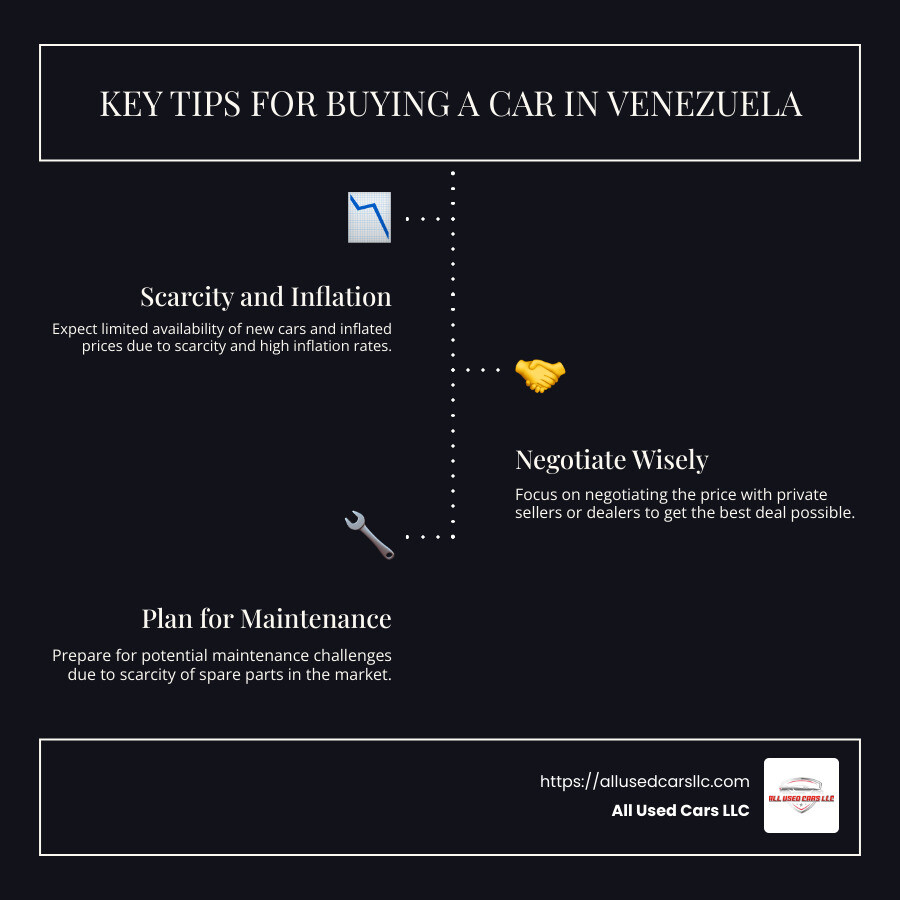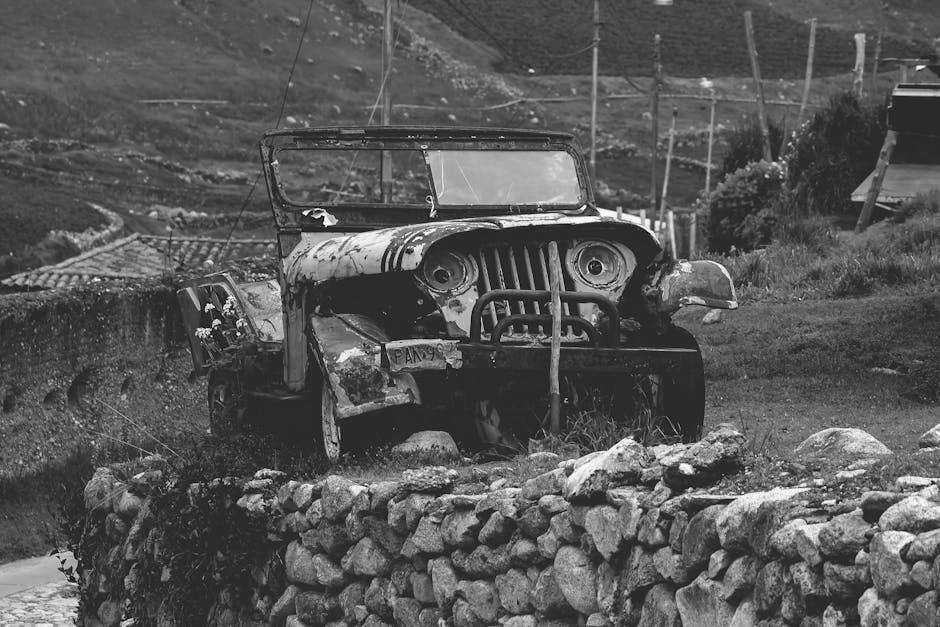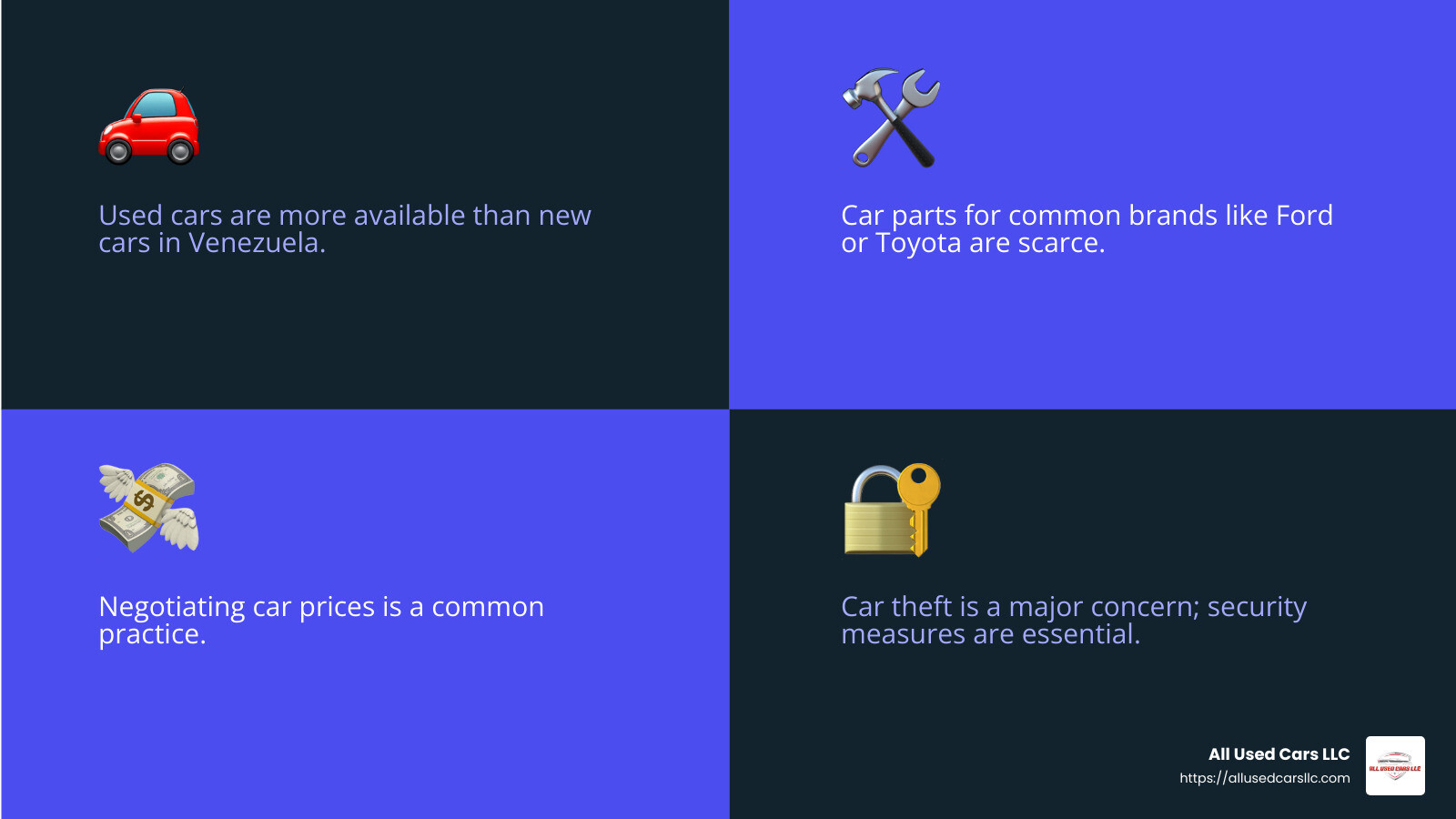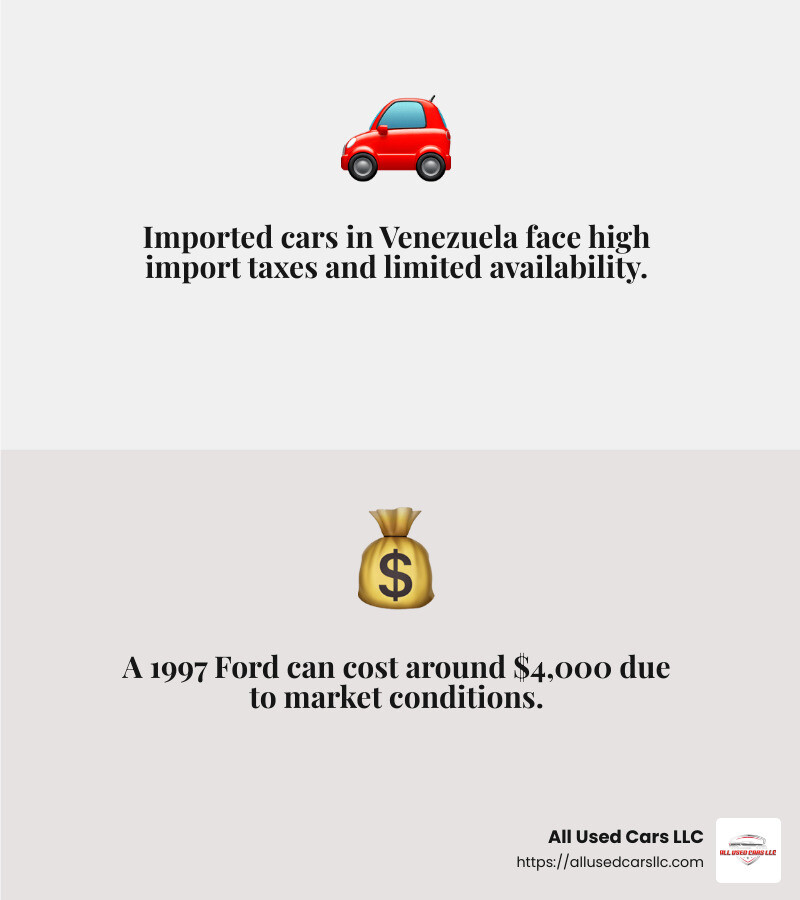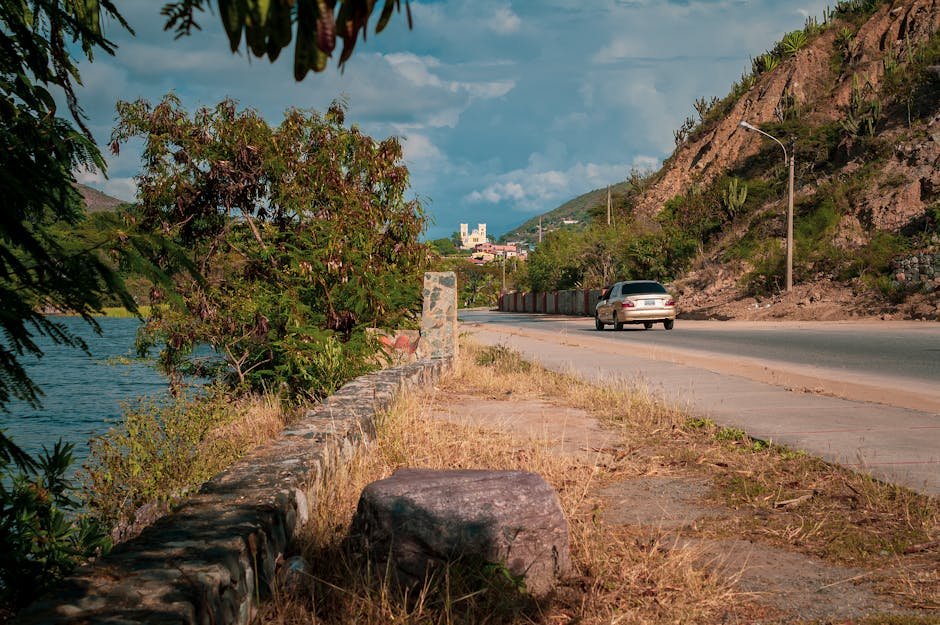
Tips for buying a car in Venezuela: 5 Essential Hacks
Tips for buying a car in Venezuela can be complex due to the unique challenges in the country. If you’re looking for a reliable vehicle without spending too much, consider these quick pointers: expect a scarcity of new cars, as most available options are used. Focus on negotiating hard during purchase since prices can be inflated by scarcity and the nation’s high inflation rates. Plan for potential maintenance hassles, as spare parts may be hard to come by.
Owning a car in Venezuela is not for the faint of heart. The country is known for its breathtaking landscapes and vibrant culture, but when it comes to purchasing a vehicle, buyers often face challenges such as scarcity and inflation. The limited selection, due in part to currency exchange restrictions and economic instability, means that finding a car often involves dealing with options that are either overpriced or lacking in quality. Additionally, recent data suggests that buying a new vehicle might not even be an option for many, as car dealerships are frequently empty of new models.
The scarcity of vehicles and financial problems change the buying process dramatically. Inflation further complicates this by increasing the cost of owning and maintaining a car. Whether you’re a local or a foreign national with a residency permit, navigating the market to find a cost-effective, reliable vehicle can often feel like an obstacle course.
Here’s a helpful visual that sums up these key tips:
Simple guide to Tips for buying a car in Venezuela terms:
Navigating the Venezuelan car market is like walking through a maze. Scarcity of new vehicles is a significant issue. Many car dealerships are often empty, with new cars being a rare sight. This scarcity is largely due to currency exchange restrictions. These restrictions make it difficult to import vehicles, leading to a limited supply and driving up prices for the cars that are available.
Inflation adds another layer of complexity. Venezuela has one of the highest inflation rates in the world, which impacts all aspects of life, including car prices. Cars can cost double what they might in the United States, for example, because of the inflated prices caused by economic instability.
Due to these challenges, most people end up buying used cars, often from private sellers. These cars might come with their own set of problems, as many are sold due to existing issues. Furthermore, the scarcity of car parts means repairs can be costly and time-consuming, making it crucial to thoroughly inspect any potential purchase.
Finally, potential buyers must also contend with the currency exchange restrictions that affect every transaction. These restrictions can complicate the payment process, especially for foreign nationals who need to steer both local laws and currency exchange issues.
Understanding these challenges is key to successfully buying a car in Venezuela. The market is tough, but with the right knowledge and preparation, it’s possible to find a vehicle that suits your needs.
Tips for Buying a Car in Venezuela
Buying a car in Venezuela requires careful planning and an understanding of the local market dynamics. Here are some essential tips to guide you through the process:
Used Cars and Private Sellers
Given the scarcity of new vehicles, used cars are often the only option. Most used cars are sold by private sellers rather than dealerships. This means you need to be extra vigilant. Always inspect the car thoroughly. If possible, bring a trusted mechanic to check for hidden issues.
Many cars are sold because they have problems, so don’t rush into a purchase. Haggling is common, so negotiate the price to ensure you get the best deal possible.
Paperwork
Once you’ve agreed on a price, get ready for the paperwork. Transferring ownership requires a certificate from the National Registry of Vehicles. This involves submitting the original vehicle registration certificate and your ID or passport. Be prepared to pay a fee for this certificate.
Also, keep in mind that you’ll need a residency permit to buy a car. Tourists or temporary visitors are not allowed to purchase vehicles.
Car Parts Scarcity
A challenge you’ll face is the scarcity of car parts. Parts for common brands like Ford or Toyota are easier to find, but even these can be limited. Some owners even bring parts from abroad. Be prepared to wait for parts, and expect them to be expensive.
Security Measures
Car theft is a real concern in Venezuela. To protect your investment, consider installing multiple security features. A car alarm, a dashboard camera, and a gear lock can deter thieves. Also, get insurance specifically for car theft.
Driving during the day in crowded areas and having passengers can also reduce the risk of theft. Always stay alert and be prepared to act quickly if you feel threatened.
By following these tips for buying a car in Venezuela, you can steer the challenges of the local market and secure a vehicle that meets your needs. Up next, we’ll cover the steps involved in the purchase process, including necessary paperwork and registration.
Navigating the Purchase Process
Buying a car in Venezuela involves several important steps. Understanding the process can save you time and frustration. Here’s what you need to know:
Residency Permit
First things first, you need a residency permit to buy a car in Venezuela. This is a legal requirement. Unfortunately, tourists or temporary visitors are not eligible to purchase vehicles. Make sure your residency status is sorted before you start shopping for a car.
Paperwork
Once you’ve found your car, it’s time for the paperwork. You’ll need to transfer ownership at the National Registry of Vehicles. Here’s what you need:
- Original vehicle registration certificate
- Your ID or passport
- Certificate of ownership
Be prepared to pay a fee for processing these documents. It’s a crucial step, so ensure all your paperwork is to avoid any delays.
Registration
After the ownership transfer, you must register the car in your name. This involves submitting the necessary documents and paying a registration fee. Registration is essential to legally drive your vehicle on Venezuelan roads. Don’t skip this step!
Insurance
Insurance is not just a good idea—it’s a necessity. Given the risks of car theft and accidents, having comprehensive insurance is vital. Look for insurance that covers theft, accidents, and any potential damage. This will give you peace of mind and protect your investment.
By understanding these steps—residency permit, paperwork, registration, and insurance—you can smoothly steer the car-buying process in Venezuela. Next, we’ll tackle some frequently asked questions about buying a car in this complex market.
Frequently Asked Questions about Buying a Car in Venezuela
How expensive is a car in Venezuela?
Buying a car in Venezuela can be quite costly due to several factors. Imported cars are particularly expensive because of high import taxes and limited availability. The scarcity of new vehicles, combined with currency exchange restrictions and inflation, pushes prices up significantly. For example, a 1997 Ford, which might have little value in the U.S., could fetch around $4,000 in Venezuela due to these market conditions.
What is the best selling car in Venezuela?
The Toyota Fortuner stands out as one of the best-selling cars in Venezuela. Despite the challenges in the car market, this model has managed to maintain its popularity. The Fortuner’s reputation for reliability and the relative availability of its parts make it a preferred choice among Venezuelans. Sales data consistently show its strong performance in the market, highlighting its appeal in a country where car options are limited.
Can foreign nationals buy a car in Venezuela?
Yes, foreign nationals can buy a car in Venezuela, but there are restrictions. You must have a valid residency permit to make a purchase. This means tourists or those on temporary visas are not eligible to buy vehicles. If you’re planning to stay in Venezuela long-term and need a car, securing your residency status is the first step. Once you have your residency permit, you can proceed with the purchase, following the necessary legal and registration processes.
Conclusion
Buying a car in Venezuela is no small feat. The process is filled with challenges like high prices, scarcity of vehicles, and the need for extensive paperwork. However, for those determined to steer this complex market, understanding the local conditions is crucial.
At All Used Cars LLC, we understand the intricacies of buying a car, whether in Venezuela or anywhere else. While our primary operations are based in the USA, we offer secure financing options to help ease the financial burden and make the car-buying process smoother for international buyers as well.
Our extensive dealer network across the USA ensures that you have access to a wide selection of top-quality used vehicles. This network can be a vital resource for anyone looking to purchase or import a car, especially in a market as challenging as Venezuela.
If you’re considering buying a car, whether locally or for import, explore our used Toyota for sale for reliable options that suit your needs. Let us help you find the right vehicle with confidence and peace of mind.
